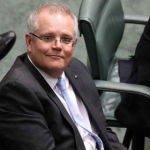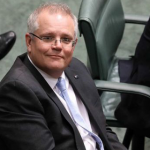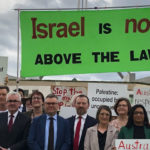Albanese Ought to Recognise the State of Palestine, as Wong Put It Firmly on the Agenda

Labor’s 2021 National Platform states that while the party supports the two-state solution in regard to Palestine and Israel, it “calls on the next Labor government to recognise Palestine as a state and expects that this issue will be an important priority for the next Labor government”.
That would be the Albanese government.
The resolution was passed by federal Labor at the party’s 2018 national conference, and the force behind the policy shift was then shadow foreign minister Penny Wong, and the senator was also behind the push for its incorporation into the national platform in 2021.
This issue has come to the fore, as, at the recent Victorian Labor conference, the state party adopted a resolution calling on the “Albanese Labor government to recognise the Palestinian state within the term of this parliament, joining with 138 countries and the Vatican, which have already done so”.
Indeed, in 2013, Australian Jewish News dubbed the current PM Anthony Albanese as “unashamedly pro-Palestinian” and “a founder of the federal Parliamentary Friends of Palestine”. But it then welcomed the then deputy PM’s opposition to the Boycott, Divestment and Sanctions movement.
However, on addressing the Australia-Israel Chamber of Commerce last Friday, Albanese restated Labor’s support for the two-state solution and that his party “will take a principled approach on this issue”.
And in the absence of any mention of recognising Palestine as a state, the PM affirmed it won’t be happening.
A tale of multiple oppressions
During his 30 June chamber of commerce speech, the PM compared the subjugation of First Nations peoples in this country, in reference to the upcoming Voice referendum, to the oppression Jewish people have long suffered, especially last century in Europe.
However, when it comes to the modern-day state of Israel, if one was to honestly make a correlation between the disparities suffered by the Aboriginal and Torres Strait Islander peoples of this continent, it would be with the Palestinian people who are now facing genocide and dispossession.
This is no controversial matter, either. Amnesty International released a 280-page report in February last year, titled Israel’s Apartheid Against Palestinians: Cruel System of Domination and Crime Against Humanity.
But as the charges build against Israel’s treatment of Palestinians, it’s digging in its heels.
Formed last December, the current Israeli government is the most right-wing the nation has ever seen, and its hellbent on passing laws that would undermine the judiciary in preventing it from overturning unjust laws, along with providing parliament with the ability to reverse precedents.
And last month saw the Netanyahu government approve 4,560 new housing units to be built in the West Bank, which being occupied Palestinian territory makes this an illegal act under international law, and it did this via bypassing a 27-year-old six-stage settlement approval process.
Supporting two states isn’t enough
“It is a source of pride that Australia played the role it did in the founding of the modern state of Israel,” Albanese told the commerce chamber. He added that in playing a central role in forming the United Nations, Labor leader Doc Evatt regarded the establishment of Israel as a great victory.
But despite the destruction that state is now wreaking upon the Palestinians, and key players in his government, a majority of his party’s rank and file, and a large section of the Australian constituency all in support of Palestine, the government doesn’t appear that it will actually recognise the state.
As the Australia Palestine Advocacy Network (APAN) explains, “In 1947, Australia voted to divide Palestine, then recognised the state of Israel in 1948, but as yet, has failed to recognise Palestine”, even though the plan “stipulated there would be two-states established: Israel and Palestine”.
So, this lack of recognition by Australia and many other prominent nations around the globe, means that in entering into any dialogue, Israel, a fully self-determining and recognised government sits down to negotiate with a largely unrecognised Palestine, of which it’s in the process of destroying.
In the Albanese government’s favour, it has made progress on rolling back the Trump-inspired measures that former PM Scott Morrison destructively carried out in relation to Israel during his reign of cluelessness, and Labor continues to stipulate in its platform that it will recognise Palestine.
Positive politicking
Wong announced in October last year that her government had reversed Morrison’s decision to recognise West Jerusalem as the capital of Israel. And whilst the Coalition cut aid to Palestinians, Labor has moved to increase it since taking office.
And in June last year, Australia refused to sign onto a US-led statement calling out the UN Human Rights Council for targeting Israel and further, to put an end to the current UN inquiry into human rights issues in the region.
Although, Australia did agree with the US in considering that the UNHRC brings “disproportionate scrutiny to Israel”.
Wong also joined her UK and Canadian counterparts on Saturday, in condemning the Israeli government’s undermining of the settlement approval process last month and the sanctioning of new housing units in the West Bank that, as of last week, now amounts to 5,700 new Israeli homes.
However, Wong made clear in February 2022, that her party “does not agree with the use of the term apartheid”, in relation to Israel. And she added that it “is not helpful in progressing the meaningful dialogue and negotiation necessary to achieve a just and enduring peace”.
So, the question remains, as to whether Labor was ever serious about recognising Palestine, or if its resolutions and statements of support of the Palestinian people were simply profitable rhetoric, when it was scratching for votes in opposition.
Weighing up the costs
The Boycott, Divestment and Sanctions movement calls for a worldwide boycott of Israeli-made products and events. And it takes its inspiration from the global boycott campaign launched by the 1980s South African Anti-Apartheid movement, which was successful in its approach.
But Albanese is dead against the BDS movement. In fact, he recalled at last Friday’s meeting with the Israel-Australia Chamber of Commerce that he was outraged when he saw “Green Party” members campaigning in the support of the movement, at a forum in Marrickville a few years back.
“I said to them, ‘Okay, everyone here get out your mobile phones and hold them up’, they all did and I said, ‘Okay, well just go put it in the bin because there’s not a mobile phone in the world that doesn’t have IP that was developed in Israel’,” the PM told the crowd.
So, Albanese’s message is clear technological advancements that result in new products outweigh the lives of oppressed peoples. And if boycotting Israel means that we’d miss out on commercially sold items, then it’s best that we leave that nation alone to annihilate the Palestinian people.
And that’s most likely what AUKUS leader Joe Biden would tell his new deputy if he even so much as attempted to mention Australia recognising Palestine as a state.







